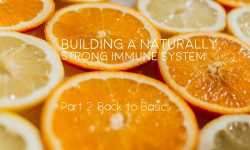It’s week 2 of our Everyday Detox series! If you missed the first week, you can find it right here.
Today we’re going to talk about reducing exposure to toxins because it’s known that many different chemicals can negatively impact our hormones.
It’s no secret that we’re constantly exposed to toxins on a daily basis. From what we eat to what we put on our skin to the air we breathe – we will never be able to eliminate all toxins from our lives. But we can help reduce some of that toxic burden on our body, allowing our organs of detoxification to work more efficiently.
Today I want to talk about how to reduce the toxin exposure we get from foods – specifically pesticides. And I know you’re probably thinking: “I already know what she’s going to say: Buy everything organic.” And that’s where you would be wrong!
I don’t believe that everything needs to be organic – but that you want to shop wisely and buy the most contaminated foods organic & save your money and buy the rest non-organic – and I’ll share my fave FREE resource to help you learn the difference.
To help me make sure I’m buying organic the smart way, I use research put out by an organization called the Environmental Working Group (EWG). They do a lot of great work and just this week, they updated their list of 48 commonly eaten fruits & veggies tested for the amount of pesticide residue found on them after washing & peeling. After analyzing all of the produce they ranked them from most to least pesticide residue and developed 2 helpful lists:
- The Clean 15: the 15 vegetables or fruits found to have the least pesticide residue
- The Dirty Dozen: the 12 vegetables or fruits found to have the most pesticide residue.
It’s been shown that pesticides can contain chemicals that may disrupt our hormones. They can also simply add to the toxic burden our liver has to deal with on a daily basis, overburdening its detoxification pathways, and giving the liver more work than it can handle.
How can you use this list to reduce your toxin exposure?
To reduce your pesticide & overall toxin exposure:
- Shop for produce on the Clean 15 List every week. Eating more of these veggies & fruits on a daily basis helps give you the nutrients & fibre you need while limiting your pesticide exposure.
- If you can afford it, buy certified organic versions of the produce on the Dirty Dozen list. That way you can enjoy their health benefits on a daily basis without worrying about giving your liver excessive toxins to detoxify.
- If you can’t afford to buy organic at all, as I know it can get expensive, try to at least avoid eating the produce on the Dirty Dozen on a daily basis. Instead, choose to eat them only once or twice a week, or once or twice a month – depending on how much you want to reduce your overall toxic load. Replace Dirty Dozen veggies in recipes with those found on the Clean 15 whenever possible.
How do you know if you need to reduce your pesticide exposure?
Most people can benefit from reducing their exposure to toxins but especially:
- People interested in preparing themselves for optimal fertility
- People who suffer from symptoms of hormone imbalance:
- Perimenopause: hot flashes, insomnia, anxiety, irritability
- Menstrual concerns: painful, heavy, irregular periods or short, long irregular cycles including suspected or diagnosed fibroids, endometriosis, or PCOS
- Thyroid imbalance: hypothyroid or hyperthyroidism, Hashimoto’s thyroiditis
- People trying to achieve a healthier weight
- People with allergies & sensitivities (environmental, food, chemical)
- People with chronic skin conditions (eczema, psoriasis, acne)
- People with chronic pain and inflammation including migraines/headaches
- People with digestive issues: constipation, infrequent or irregular bowel movements
Final Thoughts
As you can see, many people can benefit from reducing their toxin exposure and minimizing pesticide ingestion, using these EWG lists make it easy to get started.
At the end of the day, even with considering pesticide exposure, the benefits of eating vegetables & fruits in terms of their fibre, antioxidant, vitamin and mineral content outweigh the risk of pesticide exposure, for most people, so it’s still always important to get your veggies & fruits in on a daily basis regardless of pesticide exposure. I hope that this blog helps you make wiser choices for you & your family.
I’ll see you next week where I’ll be sharing another everyday detox tip with you.
Take good care of your Self until then!
Ready for a one-on-one personalized fertility program to support you as you’re trying to conceive?
Click here to learn how Dr. Odette can help maximize your chances of getting pregnant whether you’re just starting to try to get pregnant this year or you are further along on your TTC (trying to conceive) journey.
If you’re ready for one-on-one naturopathic care backed by 15 years of experience helping people start and expand their families, click here or on the button below to get started.
You can also use the above button to book a complimentary no-obligation 15-minute Optimal Health Meet & Greet Visit so you can ask me questions about my approach to helping you feel your best through perimenopause & beyond – before committing to an initial naturopathic visit.



